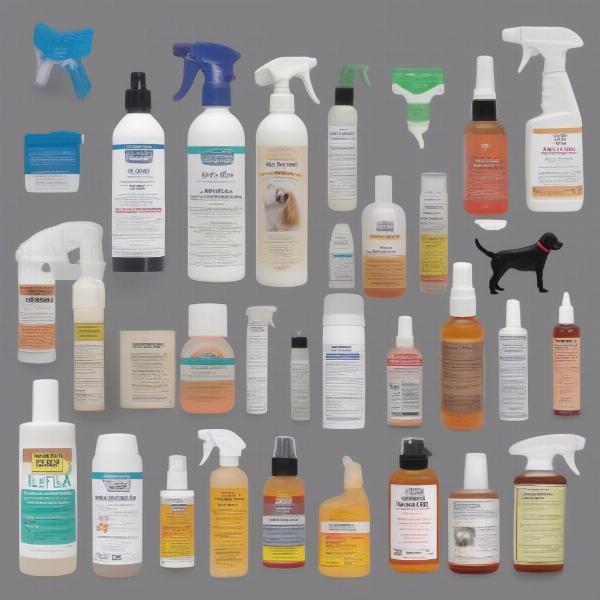Finding the best flea treatment for your dog can be overwhelming. With so many options available, from spot-ons to oral medications and collars, it’s important to understand what works best for your dog’s breed, age, lifestyle, and overall health. This comprehensive guide will explore the best flea treatments for dogs, helping you make an informed decision to keep your furry friend happy and bite-free.
Understanding Flea Infestations in Dogs
Fleas are tiny, wingless parasites that feed on the blood of mammals and birds. They can cause intense itching and discomfort for your dog, leading to excessive scratching, skin irritation, and even hair loss. Beyond the immediate discomfort, fleas can transmit diseases and parasites, making effective flea control crucial.
Types of Flea Treatments for Dogs
Several types of flea treatments are available for dogs, each with its own advantages and disadvantages.
- Spot-on Treatments: These topical solutions are applied directly to your dog’s skin, usually between the shoulder blades. They spread through the oils in your dog’s coat, killing adult fleas and sometimes preventing future infestations.
- Oral Medications: These chewable tablets or pills are ingested and work systemically to kill fleas. They are generally fast-acting and effective, offering quick relief from infestations.
- Flea Collars: These collars release insecticide over time, killing and repelling fleas. They provide long-lasting protection, typically for several months.
- Flea Shampoos and Sprays: While these offer immediate relief by killing fleas on contact, they don’t offer long-term protection and are best used in conjunction with other preventative measures.
 Best Flea Treatment Options for Dogs
Best Flea Treatment Options for Dogs
Choosing the Right Flea Treatment for Your Dog
Selecting the best flea treatment depends on several factors, including your dog’s age, breed, health status, and lifestyle. Puppies and pregnant or lactating dogs may require specific formulations, so always consult with your veterinarian before choosing a treatment. Consider factors such as:
- Effectiveness: How quickly does the treatment kill fleas and how long does the protection last?
- Safety: Is the treatment safe for your dog’s age and health condition? Are there any potential side effects?
- Ease of Application: How easy is it to administer the treatment? Some dogs may be resistant to certain application methods.
- Cost: Flea treatments vary in price, so consider your budget when making a decision.
Natural Flea Treatments for Dogs
For dog owners seeking natural alternatives, several options exist, though their effectiveness may vary. These include:
- Diatomaceous Earth: This powder made from fossilized algae can dehydrate fleas, but it’s essential to use food-grade diatomaceous earth and avoid inhalation.
- Essential Oils: Certain essential oils, like lavender and cedarwood, are believed to repel fleas. However, it’s crucial to dilute them properly and consult a veterinarian before use, as some oils can be toxic to dogs.
- Apple Cider Vinegar: Diluted apple cider vinegar can be sprayed on your dog’s coat to deter fleas, but it’s not a guaranteed solution.
Preventing Flea Infestations
Prevention is key to controlling fleas. Regular grooming, including bathing and brushing, can help remove fleas and their eggs. Vacuuming your home frequently, especially in areas where your dog spends most of its time, can also help eliminate fleas and larvae. Washing your dog’s bedding regularly in hot water is also essential.
When to Consult Your Veterinarian
If your dog is experiencing a severe flea infestation or showing signs of flea allergy dermatitis, it’s crucial to consult your veterinarian. They can recommend the most effective and safe flea treatment and provide advice on managing any related health issues.
Conclusion
Finding the best flea treatment for dogs requires careful consideration of your pet’s individual needs and lifestyle. By understanding the different treatment options, their pros and cons, and by implementing preventative measures, you can keep your dog flea-free and healthy. Remember to always consult with your veterinarian if you have any concerns about flea control or your dog’s health.
FAQ
- How often should I treat my dog for fleas? This depends on the specific product and your dog’s individual needs. Consult your veterinarian or the product instructions.
- Can I use cat flea treatment on my dog? No, never use cat flea treatment on a dog, as some ingredients can be toxic to dogs.
- What are the signs of a flea allergy in dogs? Excessive itching, scratching, hair loss, and skin inflammation can be signs of a flea allergy.
- Are natural flea treatments as effective as chemical treatments? Natural treatments may offer some repellent properties, but they may not be as effective as chemical treatments for severe infestations.
- How can I prevent fleas in my home? Regular vacuuming, washing bedding in hot water, and treating your yard can help prevent fleas.
- Can fleas transmit diseases to humans? Yes, fleas can transmit diseases to both animals and humans.
- What should I do if my dog has a severe flea infestation? Consult your veterinarian immediately for appropriate treatment.
best flea treatments for dogs uk
best flea treatment for dogs nz
best uk flea treatment for dogs
best flea tick treatment for dogs uk
ILM Dog is a leading international dog care website dedicated to providing expert advice on all aspects of dog ownership, from breed selection and puppy care to senior dog health and training. We offer practical, reliable information and resources to help dog owners worldwide provide the best possible care for their furry companions. For personalized guidance on dog health, nutrition, or behavior, contact us via email at [email protected] or phone at +44 20-3965-8624.